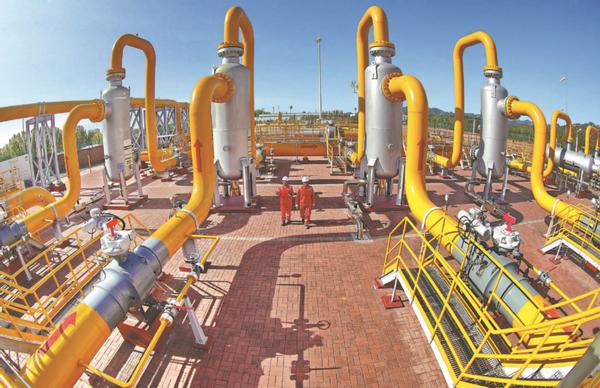 |
 |
 |
 |
 |
 |
 |
 |
 |
 |  |
 |
 |
 |
 |
 |
 |
 |
 |
 |
 |
 |
 |
 Technicians conduct routine inspections on a China-Russia east-route natural gas pipeline in Qinhuangdao, a city in North China's Hebei province, in September 2023. (CAO JIANXIONG/FOR CHINA DAILY) Russia and China are forging a broader and greener energy partnership that far transcends the traditional fossil energy trade, taking in hydrogen and renewables, according to a think tank official. This deepening partnership signals broadening cooperation between the two countries, encompassing many sectors, said Zhang Xiuling, director of the Overseas Investment Environment Department, which is part of China National Petroleum Corp's Beijing-based Economics and Technology Research Institute. Russia was China's leading crude oil supplier for the second year in a row last year, driven by surging pipeline capacity, Zhang said. "Over the past 30 years, collaboration has expanded from the trade in oil to natural gas, pipelines, upstream exploration and development, engineering construction and equipment exports," she added. In a turbulent global energy market, China and Russia, working closely together, contribute to the global energy supply and equilibrium of demand, Zhang said. "The market continues to be volatile, and competition in the energy field is intensifying, influenced by geopolitics, technological advances, responses to climate change and supply chain restructuring. With all of this, the rapid and stable development of China-Russia oil and gas collaboration is all the more important," she said. The partnership not only bolsters energy security for both countries, but also contributes to the stability of global energy supply chains and the balance of global energy demand and supply within an open and diversified environment, Zhang said, adding that Russia's role in bolstering China's energy security cannot be underestimated. The China-Russia east-route natural gas pipeline, with the largest single-line gas transmission capacity in China, is expected to play an ever greater role, she said. The pipeline, the third cross-border long-distance natural gas pipeline to supply China, following the China-Central Asia and China-Myanmar pipelines, was fully connected at the end of last year and is operating at full capacity, with an annual transmission volume of 38 billion cubic meters of gas, according to its operator, China Oil &Gas Pipeline Network Corp. Wang Hongzhi, head of the National Energy Administration, said earlier that the government is committed to implementing with its Russian counterparts the important consensus on energy collaboration reached by the leaders of the two countries. The General Administration of Customs said that while most of China's oil imports still come from the Middle East, the country imported 108 million metric tons of crude oil from Russia last year, equivalent to 2.17 million barrels per day and accounting for about 20 percent of its total crude imports. The 31 billion cubic meters of pipeline natural gas imported from Russia last year was complemented by 8.3 million tons of liquefied natural gas, making Russia one of China's key gas suppliers in 2024. The geographical proximity of the two countries is a crucial advantage, because oil and gas pipelines connecting the two countries bypass other countries, reducing political and military risks associated with transit routes, Zhang said. Long-term oil and gas trade contracts with Russia have been consistently honored, and pipeline supplies have remained stable and reliable, she said. Zhang also said she envisions deeper alignment and expanded collaboration across the industry value chain. Emerging sectors such as hydrogen and carbon capture, utilization and storage, alongside carbon markets, present significant growth potential, aligning with both countries' goals of carbon neutrality, she said. Russia aims to become a major global hydrogen supplier, using its natural gas resources for blue hydrogen and nuclear power for yellow hydrogen, Zhang said. Blue hydrogen is made from natural gas, but the carbon dioxide released during production is captured and stored instead of being released into the atmosphere, making it cleaner than regular hydrogen made from natural gas. Yellow hydrogen is produced using electricity from nuclear power plants to split water molecules into hydrogen and oxygen, a low-carbon process because nuclear energy itself does not directly release greenhouse gases. At the same time, China, with its advanced hydrogen technology and growing market demand, complements Russia's resource potential, creating a foundation for comprehensive hydrogen industry collaboration, she said. In carbon markets, Russia has potential as a major carbon credit seller, given its wealth of resources and nascent carbon trading market, Zhang said. She also sees opportunities for collaboration in low-carbon technologies, carbon footprint monitoring, carbon capture, utilization and storage, and carbon market integration, given the rapid advances that China is making with solar and wind power, electric vehicles and carbon markets. "With both countries aiming for carbon neutrality before 2060, there is a lot of room for us to work together on hydrogen and carbon capture, utilization and storage," Zhang said. "There is huge potential for a comprehensive partnership that extends beyond traditional fossil fuels into a new era of green energy collaboration." |
广告合作(Contact Us)|关于我们|小黑屋|Archiver|哈密尔顿华人网
GMT-4, 2025-5-9 19:06
Powered by Discuz! X3.5
© 2001-2025 Discuz! Team.